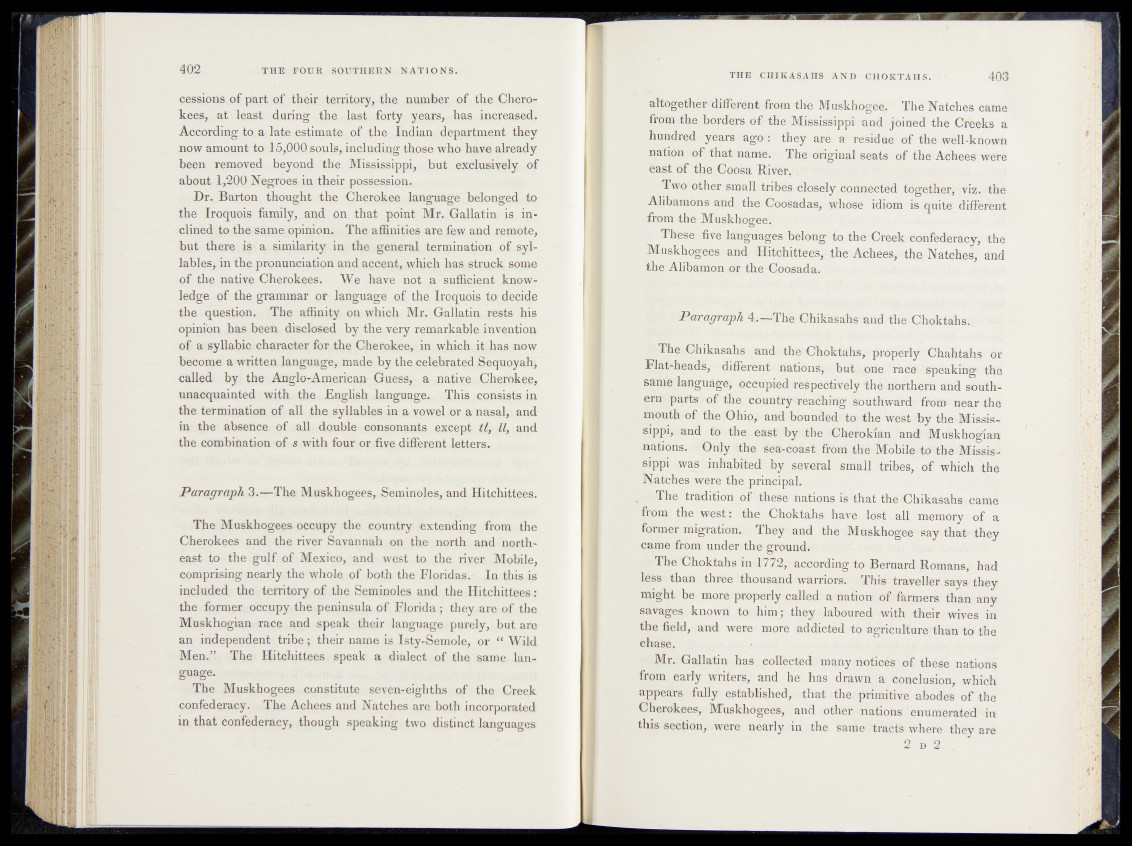
cessions of part of their territory, the number of the Cherokees,
at least during the last forty years, has increased.
According to a late estimate of the Indian. department they
now amount to 15,000 souls, including those who have already
been removed beyond the Mississippi, but exclusively of
about 1,200 Negroes in then possession.
Dr. Barton, thought the Cherokee language belonged to
the Iroquois family,, and on that point Mr. Gallatin is inclined
to the same opinion. The affinities are few and remote,
but there is a similarity in the general termination o^ syllables,
in the pronunciation and accent, which has struck some
of the native Cherokees. We have not a sufficient knowledge
of the grammar or language of the Iroquois to decide
the question. The affinity on which Mr, Gallatin rests his
opinion has been disclosed by the very remarkable invention
of a syllabic character for the Cherokee,, in which it has now
become a written language, made by the celebrated Sequoyah,
called by the Anglo-American Guess, a native Cherokee,
unacquainted with the English language. This consists in
the termination of all the syllables in a vowel or a nasal> and
in the absence of all double consonants except tl, ll, and
the combination of s with four or five different letters.
Paragraph 3.—The Muskhogees, Seminoles, and Hitchittees.
The Muskhogees occupy the country -extending from the
Cherokees and the river Savannah on the north and northeast
to the gulf of Mexico, and west to the river Mobile,
comprising nearly the whole of both the Florid as. In this is
included die territory of the Seminoles and the Hitchittees !
the former occupy the peninsula pf Florida; they are of the
Muskhogian race and speak their language purely, , but are
an independent tribe; their name is Isty-Semole, or “ Wild
Men-lfi The Hitchittees speak a dialect of the same language.
The Muskhogees constitute seven-eighths of the Creek
confederacy. The Achees and Natches are both incorporated
in that confederacy, though speaking two distinct languages
altogether different from the Muskhogfie. The Natches came
from the borders of the Mississippi and joined the Creeks a
hundred years ago : they are a residue of the well-known
nation of that name. The original Seats of the Achees were
east of the Coosa River, VTwo
other small tribes closely connected together, viz. the
Alibamons and the Coosadas, whose idiom is quite different
from the Muskhbgeet*1-’
These five languages belong to the'-Creek confederacy, -the
Muskhogees* and Hitchittees, the AcheeS, the-1 Natches", and
the Alibamon or the Coosada.
Paragraph 4.^ThfeAChikasahs and tbnGhoktahs.
The Chikasahs and the’Chokfiahs, properly Chahtahs« or
Flat-heads,^1 different nations;* but|pile f race I speaking the
same language; occupied Tespeetively the northern and southern
parts- of the country reaching Southward from near the
mouth of the Ohio, and bounded' t(Mhe -west by the Missis-
sippi, and to the east by the Cherokian and Muskho^a®;i
nations. «•<*Only the sfea?-e©ast from the Mobile?-to >the Mississippi
was inhabited by several small tribes, of which the
Natches were the principal,
, The tradition of these* Nations is that tbe*Chikasahs came
from the west; the Choktahs have--- lost all -memory of a
former migration. They and the Muskhogee ' say that' they
came from under the ground.*«
The Choktahs in 17.7% according to Bernard Romans, had;
less than three thousand warriors. This ! traveller says they
might be more properly called a nation- of . farmers than any
savages 1 known to him; they - laboured' with to e ir wives in
the field, and were more a d d ic to d to i^ ^ to the
chase.
Mr. Gallatin has collected many notioes of these nations
from early writers, and he has drawn a- conclusion, which
appears fully established, ‘that -=the,-prioritise- abodes of the
Cherokees, Muskhogees, and other nations enumerated tin
this section, were nearly in the same tracts while they are
2 1 8 .